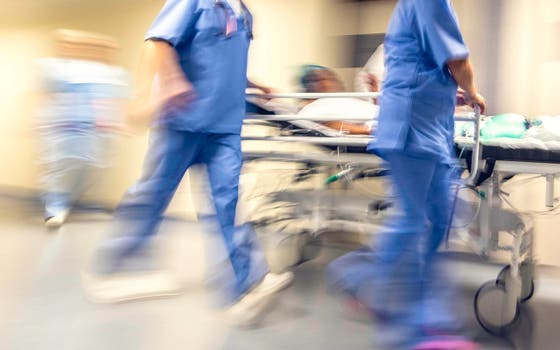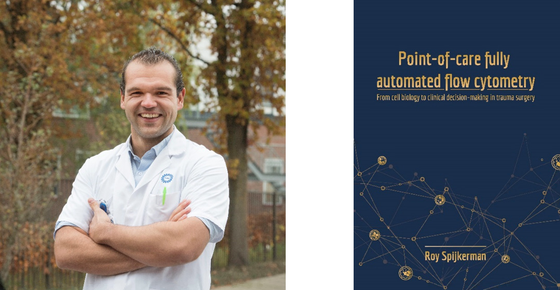Automated point-of-care immune system analysis in trauma patients may save lives

With the introduction of fully automated flow cytometry in traumatology, analysis of the immune system in trauma patients can be done much faster, better and cheaper. In addition, it no longer needs to be performed in a specialized laboratory, but can also be done in a point-of-care setting such as the emergency room, the intensive care unit, in general practice or in a field hospital. According to Roy Spijkerman (UMC Utrecht), who defended his PhD thesis on February 8 in Utrecht, this will allow for a better personalized treatment of trauma patients, with the ultimate aim of saving more lives.
More and more patients survive their initial trauma nowadays and the main reason for hospital mortality of trauma in the Western world has changed towards mortality due to immune-related complications. After surviving the initial phase, trauma patients still may die from consequences of a derailed immune response or from severe infections. Therefore, the priority in clinical decision-making in the trauma department nowadays is shifting towards prevention of such immune-related complications. The first step in this process is the rapid recognition of patients at risk for developing such potentially severe complications.
Neutrophil: biomarker of interest
Trauma leads to a complex inflammatory cascade that induces both immune activation and a refractory immune state in parallel, a balance that may derail easily. Neutrophils are the most abundant type of white blood cells and respond to many trauma-induced soluble factors originating from damaged endogenous cells as well as from microbes originating from contaminated wounds, intestinal injuries or broken barriers. As a consequence, the characteristics (phenotype) and function of the neutrophil may change (becoming less responsive and/or more immunosuppressive), which has made the neutrophil a biomarker of interest for the traumatologist.
Analysis of the immune system
Fully automated flow cytometry is a new technique for the analysis of the immune system. It has shown to increases the quality and reproducibility of immune cell analysis. Moreover, it enables point-of-care implementation and easy clinical applicability. In his PhD research, Roy Spijkerman MD (Department of Trauma Surgery and Department of Experimental Pulmonary Diseases, UMC Utrecht) has identified that the change in neutrophil characteristics early after hospital admission may adequately predict a derailment of the immune system in trauma patients. By analyzing this complex composite biomarker with help of this new technique, it has become easier to predict which patients are at increased risk for developing immune-related complications. With this knowledge, the treating physician can anticipate and adjust the treatment protocol for a particular trauma patient accordingly (damage control surgery, resuscitation, preventive antibiotics and/or timing of definitive surgery).
Faster, better, cheaper
In the medical community, conventional flow cytometry is widely used to assist in the diagnosis and prognosis of a variety of diseases. However, flow cytometry used to be an expensive and time-consuming technology and has several disadvantages.
Roy Spijkerman on the practical applicability of fully automated flow cytometry: “In our research, we explored fully automated flow cytometry - the latest development in cytometry - in traumatology. With this new technique, recently also implemented in daily clinical care at the traumatology department of UMC Utrecht, analysis of the immune system can be executed much faster, better and cheaper. In addition, it no longer needs to be performed in a specialized laboratory, but can also be done in a point-of-care setting. For example, in the emergency room, in the intensive care unit, in general practice or in a field hospital. These findings will allow for better immuno-based precision medicine at the trauma ICU, with the outlook of saving more lives in the future.”
PhD defense
Roy Spijkerman (1992, Deventer) defended his PhD thesis on February 8, 2022 at Utrecht University. The title of his thesis is “Point-of-care fully automated flow cytometry – from cell biology to clinical decision-making in trauma surgery”. Supervisors were prof. dr. Leo Koenderman (Department of Experimental Pulmonary Diseases, UMC Utrecht) and prof. dr. Loek Leenen (Department of Trauma Surgery, UMC Utrecht). Co-supervisor was dr. Falko Hietbrink (Department of Trauma Surgery, UMC Utrecht). Roy Spijkerman started in January 2022 as surgical resident not in training at the Sint Antonius Hospital in Nieuwegein.

